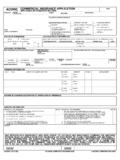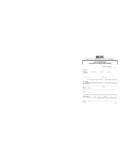Transcription of Glossary of Commercial Insurance Terms
1 Glossary of Commercial Insurance Terms Commercial Insurance is divided into two main categories: property Insurance and casualty Insurance . Property Insurance provides coverage for property that is stolen, damaged, or destroyed by a covered peril. The term "property Insurance " includes many lines of available Insurance . Commercial Property, Inland Marine, Boiler and Machinery, and Crime are the most common Commercial property coverage lines. Each of these property coverage lines is described below. Commercial PROPERTY. Coverage Sections, limits of Insurance , and Coinsurance Buildings you own or lease as a part of your business, your business personal property, and the personal property of others make up the basic coverage sections of Commercial property Insurance .
2 Commercial property Insurance can be sold separately as an individual line policy (referred to as a monoline policy), or it can be sold as part of a Commercial Package Policy (CPP), which combines two or more Commercial coverage parts such as Commercial property, general liability, and Commercial auto. Building coverage includes buildings or structures and any completed additions, which are listed on the declarations page of a Commercial policy. Permanently installed fixtures, machinery, and equipment are also insured as a part of building coverage. The limit of Insurance is the estimated amount needed to rebuild your building and to replace permanently installed fixtures, machinery, and equipment in the event of a total loss.
3 You are required under the Insurance policy to fully insure the value of your buildings. If a building is not insured to value, you can be subject to a monetary penalty at the time of a loss. This penalty is commonly referred to as "coinsurance." It is important to read and understand the coinsurance clause of your Commercial property policy and to discuss any questions with your broker-agent. Business Personal Property consists of furniture; fixtures, machinery, and equipment not permanently installed; inventory; or any other personal property owned by and used in your business. Personal Property of Others refers to property that is in your business's care, custody and control.
4 The type of business you operate will determine if you need to protect the personal property of others. Covered Causes of loss Whether or not a property loss is covered depends upon the policy language, exclusions, and endorsements. You can choose the covered causes of loss in your property policy. Causes of loss are divided into two main categories: specified perils and open perils. Specified Perils consist of a list of each peril to be insured against, such as fire, explosion, windstorm, vandalism, et cetera. You can usually request basic specified perils or broad specified perils coverage. Broad specified perils coverage adds to the list of covered perils found under basic specified perils.
5 Open Perils coverage covers all losses unless they are specifically excluded. Earth movement (including earthquake) and flood are two common perils that are excluded under open perils coverage. Since open perils coverage offers more comprehensive protection, it is more costly than a specified perils policy. Valuation Types Commercial property coverage will include a provision to determine what valuation method is to be used to pay the loss. The most common policy valuation method is Actual Cash Value (ACV). Unless otherwise defined in the policy, ACV is considered to be Fair Market Value in California. There are two other methods of property valuation: agreed value and replacement cost.
6 Agreed value waives any coinsurance penalty and pays 100% of the stated amount (agreed upon amount) for any covered loss. Replacement cost covers the amount it takes to replace your property with new property of like kind and quality up to the limits of Insurance . Like ACV, replacement cost is subject to coinsurance. Coverage forms and Endorsements There are various coverage forms and endorsements in addition to the basic property coverages already discussed that can customize coverage in a Commercial property Insurance policy. The following are the most common coverage forms and endorsements used in Commercial property Insurance : Builder's Risk - Added to a policy for a one-year minimum term to cover a new building or structure under construction or an existing structure undergoing additions, alterations, or repairs.
7 Cancellation is allowed on a pro rata basis upon project completion; however, midterm cancellation will result in a short rate penalty. A reporting form or renovations form allows coverage to be carried according to the stage of completion ( , as more of the project is completed, more value is reported, resulting in the proper amount of coverage for each stage of construction Legal Liability or Fire Legal Liability - Covers your legalliability for loss or damage to real and personal property of others as the result of your negligent acts and/or omissions. The loss or damage must be caused by a covered peril (including loss of use).)
8 The loss must be accidental and the coverage most often is purchased for tenants in Commercial buildings . Building Ordinance or Law - Provides coverage if the enforcement of any building, zoning or land use law results in loss to the undamaged portion of the building (Coverage A); demolition and removal costs of undamaged parts of the structure (Coverage B); or any increased cost of repairs or reconstruction (Coverage C). Replacement cost must be in effect for Coverage C to be applied . Improvements and Betterments - Usually added by a lienholder. Covers all permanently installed improvements and betterments, which cannot be removed when a tenant vacates the building.
9 Peak Season - An endorsement that provides additional limits on personal property inventory during a designated period of time. This is specifically used to cover fluctuating inventory values before and during peak shopping seasons. Inflation Guard - Automatically adjusts the limits of Insurance to keep up with inflation. The adjustment can be tied to the construction cost index in a regional area or a specified percentage per year. This endorsement can be very important in helping to maintain adequate coverage limits, which can protect against potential coinsurance penalties in a property loss. Time Element - Insurance that covers other losses stemming from a direct loss by a covered peril to business property.
10 Business interruption, extra expense, and loss of rents and rental value are the most common time element coverages. Business interruption coverage replaces lost business income after a covered loss. Certain key employees can be named, allowing the employer to continue to pay their salaries until the business restarts operations after a loss. Extra expense coverage mainly applies to service or product related companies where the business must continue to ensure the survival of the company. Extra expense can pay for office space, equipment rental, advertising, or most costs considered reasonable for keeping the company operating after a covered loss.



